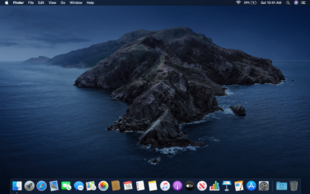
macOS Catalina
16th major version of the macOS operating system / From Wikipedia, the free encyclopedia
Dear Wikiwand AI, let's keep it short by simply answering these key questions:
Can you list the top facts and stats about MacOS Catalina?
Summarize this article for a 10 year old
macOS Catalina (version 10.15) is the sixteenth major release of macOS, Apple Inc.'s desktop operating system for Macintosh computers. It is the successor to macOS Mojave and was announced at WWDC 2019 on June 3, 2019 and released to the public on October 7, 2019. Catalina is the first version of macOS to support only 64-bit applications and the first to include Activation Lock.[3][1] It is also the last version of macOS to have the major version number of 10; its successor, Big Sur, released on November 12, 2020, is version 11.[4][5] In order to increase web compatibility, Safari, Chromium and Firefox have frozen the OS in the user agent running in subsequent releases of macOS at 10.15.7 Catalina.[6][7][8]
| Version of the macOS operating system | |
 Screenshot of the macOS Catalina desktop in dark mode | |
| Developer | Apple Inc. |
|---|---|
| OS family | |
| Source model | Closed, with open source components |
| General availability | October 7, 2019; 4 years ago (2019-10-07)[1] |
| Latest release | 10.15.7 Security Update 2022-005[2] (19H2026) (July 20, 2022; 2 years ago (2022-07-20)) [±] |
| Update method | Software Update |
| Platforms | x86-64 |
| Kernel type | Hybrid (XNU) |
| License | APSL and Apple EULA |
| Preceded by | macOS Mojave |
| Succeeded by | macOS Big Sur |
| Official website | www.apple.com/macos/catalina at the Wayback Machine (archived November 9, 2020) |
| Tagline | The power of Mac. Taken further. |
| Support status | |
| Unsupported as of November 30, 2022. Finder is still able to download driver updates to sync to newer devices. | |
The operating system is named after Santa Catalina Island, which is located off the coast of southern California.
macOS Catalina is the final version of macOS that supports the Unibody MacBook Pro, as its successor, macOS Big Sur, drops support for its mid 2012 and final model.